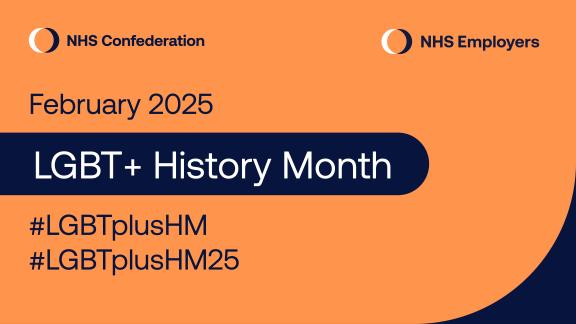LGBT+ History Month 2025

The campaign is celebrated across the NHS to increase the visibility of the entire LGBTQ+ community, as well as their history and experience.
This year’s national theme is activism and social change, celebrating LGBTQ+ people’s contribution towards creating a society that is more inclusive. We will be celebrating the activists within the NHS, driving change within their organisations and beyond. As an anchor institution, change within the NHS drives change in wider society and the Health and Care LGBTQ+ Leaders Network is a vital part of driving this change.
The NHS England equality, diversity and inclusion (EDI) improvement plan recognises the importance of NHS leaders creating an organisational culture where everyone feels they belong, including LGBTQ+ colleagues.
Improving the experience of LGBTQ+ staff and patients
The NHS Confederation's Health and Care LGBTQ+ Leaders Network’s infographic illustrates the staff experience gap in the NHS Staff Survey, with LGBTQ+ staff more likely to experience bullying and harassment, discrimination and unwanted sexual behaviour compared to their heterosexual colleagues. To help improve the experience of LGBTQ+ staff and patients, the network has produced:
- a guide to improving trans allyship across the workforce
- practical guidance for LGBTQ+ inclusion to support healthcare organisations to improve the experiences of LGBTQ+ staff and patients.
- a practical LGBTQ+ inclusion framework enabling health and care leaders to create inclusive environments for LGBTQ+ staff and service users.
Get involved
LGBT+ History Month is an opportunity for organisations across health and care to demonstrate how they are taking action to support LGBTQ+ equality in the workplace.
- If you are a leader, sign up to the inclusive leadership pledge and demonstrate your commitment to becoming an inclusive leader.
- If your network or trust is hosting an event, publishing a blog or a specific resource, please share details by emailing diversityandinclusion@nhsemployers.org and we can promote it through our channels.
- Follow us on social media and access useful resources and details of events. Connect with the Health and Care LGBTQ+ Leaders Network on LinkedIn, follow NHS Employers @NHSE_Diversity on X for more updates and use hashtag #LGBTplusHM.
- Join the Health and Care LGBTQ+ Leaders Network. Led by the NHS Confederation, this network is for LGBTQ+ leaders and allies from a diverse range of roles and backgrounds across health and care. Find out more about the network and how to join.



